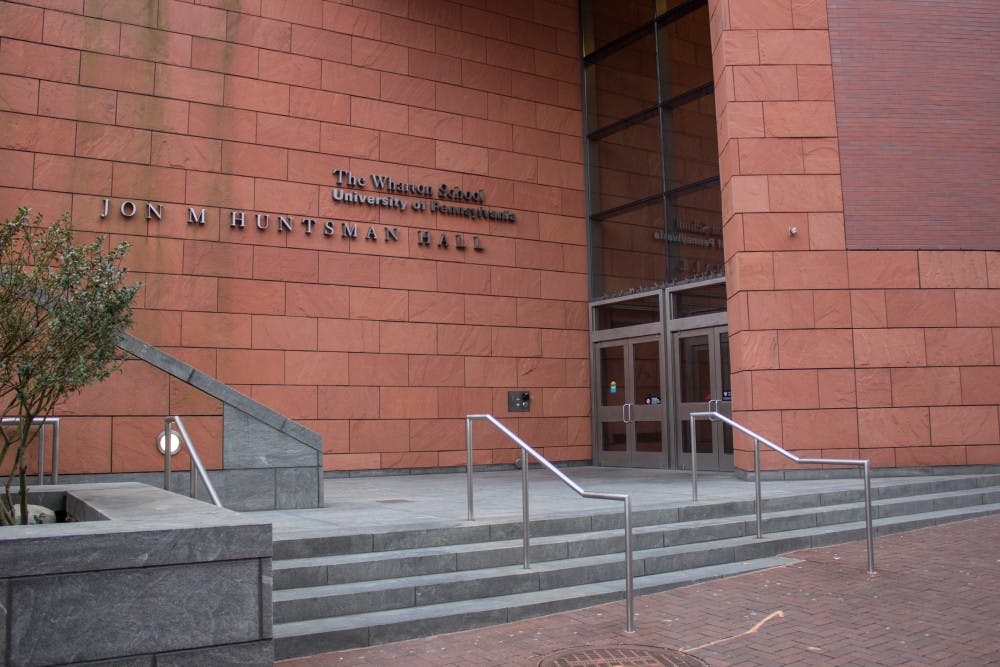
Photo from The Daily Pennsylvanian
Penn undergraduates have figured out how to eliminate lines in grocery stores and repurpose hard-to-recycle plastic.
The ideas were developed by student teams in the Wharton Business Plan Competition. The teams that developed these plans are among a total of 25 semifinalist teams. They are also the only all-undergraduate teams that are in the running for the grand prize in this year’s competition.
The BPC has taken place annually since 1998, offering Penn student entrepreneurs — undergraduate and graduate students in all schools — the opportunity to win over $125,000 in prizes to invest in their entrepreneurial ventures. There is no limit on the number of team members, and non-Penn students can participate. However, the team leader must be a degree-seeking Penn student.
One team's creations, Basket, is a free mobile app developed by three Wharton and Engineering juniors: Ben Hsu, Gagan Gupta and Alexander Sands. The app allows consumers to add their credit cards, debit cards or bank accounts to Basket’s platform and pay for items in retail stores at any point in their shopping experience by scanning the item’s barcode using the camera on their mobile phones.
The app comes with a number of advantages. Consumers will no longer need to waste time on checkout lines, and stores can cut down on the expense associated with credit card usage if consumers add their debit cards and bank accounts to Basket. Stores will also be able to repurpose their labor in several Instead of manning the cash register, employees can function more like salespeople, interacting with consumers in the aisles and generating more sales.
Basket’s success is contingent upon cooperation between consumers and stores. Stores must pay a yearly subscription fee in order to remain a participating store on the app. The fee is determined by both the relative size of the store and by the number of daily transactions conducted via Basket.
A prototype of Basket has recently been developed and the creators intend to begin piloting in stores in the fall, regardless of the outcome of the BPC.
The other semifinalist is BioCellection, Inc., which was co-founded by Jeanny Yao of the University of Toronto and College senior Miranda Wang, includes College sophomore Alexander Simafranca, College senior Eric Friedman and Engineering junior Anthony Carradorini. It was recently awarded the People’s Choice Award at the first annual College Pitch Philly Competition on Feb. 24.
BioCellection creatively repurposes hard-to-recycle, low-value plastic by using bacteria to break it down into a substance called biosurfactants, which are valued at $700 per kilogram and used in a wide range of industries. Biosurfactants have been used in wrinkle treatments, included in shampoos, used to purify soil and have helped clean up the environment after oil spills.
The biosurfactant market is valued at $2.2 billion, and while there are only 17 other companies working towards generating biosurfactants, BioCellection is the first to use this type of plastic to do so, Wang said. In the foreseeable future, BioCellection hopes to begin conducting on-site bioremediation, collecting and recreating the plastic directly from the oceans where much of it ends up as waste product.
If Basket or BioCellection makes it to the Venture Finals Round, each team will present live in front of the judges. The winning team will receive the $45,000 Perlman Prize. The Venture Finals Round will take place on April 28.
The Daily Pennsylvanian is an independent, student-run newspaper. Please consider making a donation to support the coverage that shapes the University. Your generosity ensures a future of strong journalism at Penn.
DonatePlease note All comments are eligible for publication in The Daily Pennsylvanian.




